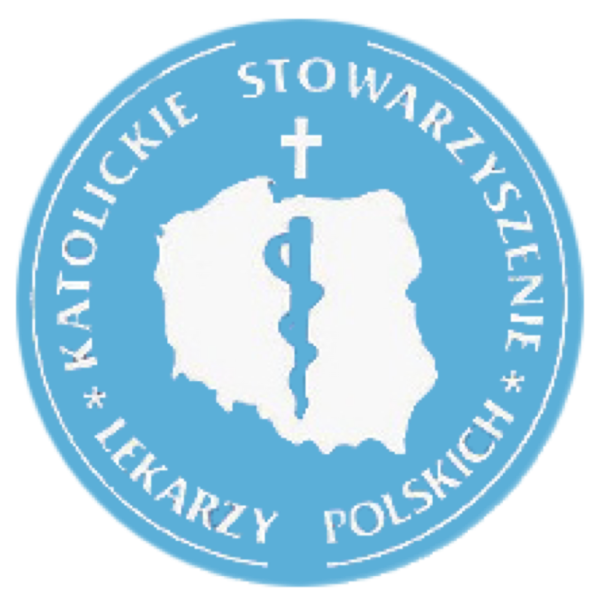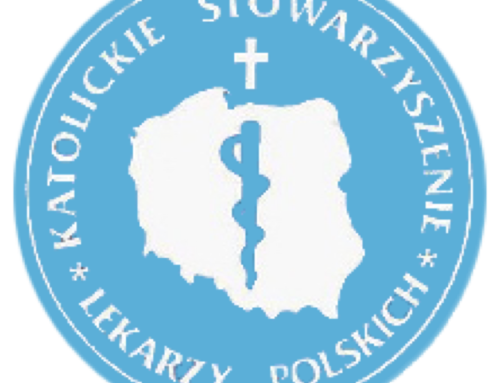POSITION OF THE CATHOLIC ASSOCIATION OF POLISH DOCTORS ON THE STATEMENT OF THE PRESIDENTIAL MEDICAL COUNCIL ON THE MANDATORY IMPLEMENTATION OF THE SUBJECT “HEALTH EDUCATION” IN POLISH SCHOOLS
Esteemed Dr. Łukasz Jankowski, President of the Supreme Medical Council January 18, 2025
Dear Mr. President, we were deeply concerned about the “unconditional” support of the Presidium of the Supreme Medical Council for maintaining the mandatory nature of the new subject “Health Education” (HE) in Polish primary and secondary schools, expressed in Position No. 4/25/P-IX, dated 14 January 2025. [1] However, the very next day this Position turned out to be irrelevant, as the Minister of Education, Barbara Nowacka, announced that the subject would be optional.
This decision is the result of numerous public statements by parents concerned about their children, whose physical, mental and spiritual health is seriously threatened by the content of this subject’s curriculum. Many institutions and non-governmental organizations also expressed their critical attitude towards the EZ core curriculum, especially the part that referred to the issue of preparing young people for future functioning in the family and sexual education. The Catholic Association of Polish Physicians also criticized in its statement on November 11, 2024 both some of the EZ curriculum content and the intention to introduce the subject in schools as a mandatory requirement. The arguments presented there remain valid, we will not cite them again. We encourage you to familiarize yourself with them. [2]
In this situation, we encourage our Esteemed Medical Colleagues from the Supreme Medical Council to also review their enthusiastic approach to the outdated mandatory introduction of a new subject, as the Minister did. Below we present arguments that may help you in this. We focus on medical matters in which we all feel competent as doctors, not avoiding arguments that are of a general and civic nature.
The content of the Position of the Presidium of the NRL does not refer to the issues that were the subject of mass social protests. The doctors, the authors of the Position do not seem to notice the enormous health damage that is associated with the introduction, in a mandatory or optional manner, of the proposed curriculum content of the EZ subject relating to permissive sexual education [3] and the sexualization of children. They will also threaten the proper functioning of families that young people will establish in the future, and the health of future generations.
Below we present in a nutshell the consequences for physical, mental and spiritual health that will inevitably occur if the subject EZ, together with its part concerning the area of human sexuality, is introduced into schools on a mandatory or optional basis. They can be found in medical textbooks.
- It should be emphasized that most of the curriculum content of the new subject, relating to the promotion of health-promoting behaviors among students, the development of appropriate habits, and necessary health care, should be included in school education within existing subjects. The content and manner of presenting these important issues, which is present in the core curriculum of the EZ subject, would require many corrections and additions. For example, the core curriculum draws attention to the prevention of obesity and metabolic syndrome, but it passes over in silence the problem of underweight, which affects many girls and has a very negative impact on health (anemia, osteoporosis, avitaminosis, menstrual cycle disorders).
- The EZ core curriculum does not mention or explain the concept of reproductive health, which refers to all aspects of reproduction in both sexes. Good reproductive health, a properly developing puberty process, the possibility of fertilization, a normal pregnancy and childbirth are crucial for every person, every family and very important for the next generations of every community. There is not a word about the need to observe the menstrual cycle in order to detect health disorders and assess fertility. There is no mention of methods of managing fertility naturally recognized by the WHO. The need to prepare for future reproduction, which helps reduce the frequency of infertility, child development defects, miscarriages and other pregnancy complications, is completely omitted. Instead, there is talk of “natural contraception”, and it is known that all contraception is unnatural by its nature.
- We believe that it is necessary to raise children and young people in the spirit of respect for human dignity, care for physical, mental and spiritual health, affirmation of fertility and care for it, respect for human life throughout its duration from the moment of conception. Health education related to human sexuality, its bonding and parenting function, should be part of education in schools, leading towards maturity. It should shape a positive image of parenthood and family, counteract factors that, acting on a young, defenseless organism, may lead in the future to irreversible consequences: infertility, cancer, chronic ailments, obstetric failures. And such can be and will be the effects of premature sexual initiation, disordered relationships in this area, sexually transmitted diseases, addictions.
- The acceptance and promotion of a selfish, consumerist attitude proposed in EZ encourages young people to seek new experiences, to take care of their own comfort and pleasure. The other person exists to express “consent”. The word “love” is not mentioned even once in the EZ core curriculum, and the greatest attention is paid to a satisfying sexual life. This shapes an egocentric approach to these matters in adult life. Separating the sexual sphere from the entire system of values of family, cultural and civilizational life causes sex to take on an instrumental character, becoming an end in itself.
- For reasons that are incomprehensible and harmful to human health, the view that good functioning of a person in the modern world depends on the universal acceptance of accepted good customs and cultural patterns is being fought against. Without logical justification, great attention is paid to so-called stereotypes relating to the sexual sphere, to their alleged “negative impact on human development and interpersonal relations” and ways of counteracting them are being discussed. It has not been specified what these harmful stereotypes are supposed to concern. It is likely that teachers are to determine at their discretion what is and what is not a “gender stereotype” so that non-governmental organizations and companies producing contraceptives can boldly enter schools and, without consulting parents, fight stereotypes as they understand them. It is possible that some of the “stereotypes” accepted for generations should be modified, but encouraging students to reject all customs, elements of culture and morality in the area of gender and procreation, such as tenderness or love, is a manifestation of revolutionary zeal, very dangerous to the physical, mental and spiritual health of society.
- The EZ core curriculum contains very dangerous references to the psychosexual orientation of children and adolescents. The changes in the appearance of the body of boys and girls during puberty are listed together, without dividing them into male and female genders. At all costs, without rationality of the message, it is emphasized that gender is something unstable, which may be subject to change. It is also written there that “the student discusses the structure and basic functions of the internal and external genitalia”, as if there were only one type of these organs, and it is common knowledge that there are two. There is a sentence that “the student discusses the concept of psychosexual orientation and the directions of its development”, suggesting that this orientation is something that develops over time, is fluid, changes in various and arbitrary directions. Then, possible directions of this development are given, which the student can follow and change at will: heterosexual, homosexual, bisexual, asexual, cis gender, trans gender. Passing on such “knowledge” without commentary may lead to tragic consequences for young people indoctrinated by this type of “health education”: gender dysphoria and subsequent attempts to change gender at the cost of irreversible damage to health.
- In the description of the EZ subject, the word “family” appears very rarely, as if for its creators it was irrelevant in the upbringing of the young generation. School, local community and even the homeland are mentioned, but the family seems to not exist. However, since in the social consciousness the family exists as a very important place of growth and upbringing, this kind of approach of the authors of the core curriculum should be treated as a desire to gradually reduce the importance of the family among students and then eliminate it from the lives of the next generations. Various “family models” are mentioned, treating them all equally. The Constitution of the Republic of Poland does not mention any different family models. The EZ program states that the student knows the rights of the child and the duties of parents, but it does not mention a word about the rights of parents, as if they did not exist or were to be irrelevant to the student.
Dear Mr. President, the entire text of the EZ core curriculum deserves criticism. Unfriendly language, excessive use of words of foreign origin, emphasis on promoting an egoistic approach among students, taking into account primarily their own benefit and pleasure. The words “friendship” and “love” almost do not exist in it. Free sexual behavior is promoted, decisions made in the sexual sphere are not to have any moral qualification. The student is to receive knowledge about sex and contraception and use it as he or she wishes. [4]
The positive assessment of egoism contained in the EZ programme, the marginalisation of ethical, family and religious values and norms, and the anti-natalist nature of the proposed model in which the phrase “reproductive health” does not exist are unacceptable.
Sex education should provide students with knowledge about the differences between the bodies of men and women, the differences between the psyche of both sexes, it cannot be separated from the world of feelings, it should not suppress the natural sensitivity or shame in young people, and gender issues should be treated as a value and good. It should take into account references to the system of values and moral norms, such as: human dignity, respect for a partner, respect for life. In this way, developing responsibility towards sexuality and interpersonal relationships that arise on its basis, it will contribute to the harmonious development of the student’s personality, her or his knowledge, emotions, culture, sensitivity, kindness, love, the ability to share these values with others.
Through you, we appeal to all our medical colleagues, especially to those representing us in the Medical Self-Government bodies, to speak out on matters related to the pro-health education of children and young people in the spirit of their true benefits, taking into account their own good health and, in the future, their families and future generations.
Yours faithfully, on behalf of the Catholic Association of Polish Physicians:
- Prof. Bogdan Chazan , specialist in gynecology and obstetrics, Vice-President of the Catholic Association of Polish Physicians (KSLP)
- Dr. n. med. Elżbieta Kortyczko, specialist in neonatology and pediatrics, President (KSLP)
- Dr. Grażyna Rybak , pediatric specialist, President of the Masovian Branch of the KSLP (OM KSLP)
- Dr. Andrzej Niemirski , specialist in internal medicine, specialist in family medicine, President of the Radom Region Branch of the KSLP (OR KSLP)
- Prof. Jerzy Jurkiewicz , neurosurgery specialist, Chairman of the Peer Court of the KSLP
- Dr. Marzenna Koszańska, pediatric specialist, Vice President of OM KSLP
- Dr. Małgorzata Kępińska , specialist in neonatology and pediatrics, Delegate of the OM KSLP
- Dr. Marzena Grzybowska , neurology specialist, Secretary of the OM KSLP
- Dr. Barbara Antoniak , gynecologist, Gynecology and Obstetrics Section of the Polish Society of Physicians and Dentists
- Dr Izabela Pakulska , internal medicine specialist, member of the Polish Society of Physicians and Surgeons (KSLP)
with the support of other medical organizations:
- Dr. n. med. Elżbieta Puacz , microbiology specialist, public health specialist,
- President of the Catholic Association of Laboratory Diagnosticians,
- Dr. Małgorzata Prusak, Ph.D. , Pharmacy Specialist, Master of Theology,
- President of the Association of Catholic Pharmacists of Poland,
- Dr. Tadeusz Wadas, Master of Science in Nursing, Ph.D. in Health, Specialist in Anesthesia and Intensive Care Nursing, President of the Catholic Association of Polish Nurses and Midwives
- Dr. Anna Szopa-Tyszecka , pulmonologist, Holy Family Medical Community
- Dr. Stanisław Nitek , MD , otolaryngology specialist, Holy Family Medical Community
[1] https://nil.org.pl/aktualnosci/8743-obowiazkowa-edukacja-zdrowotna-w-szkolach-zdrowie-do-budowania-zdroowego-spoleczenstwa
[2] https://kslp.pl/11-xi-2024-stańsko-katolickich-spowiedzen-medicznych-wobec-prob-wdrozenie-systemowej-deprawacji-seksulnej-dzieci/
[3] Sex education according to the AAP (American Academy of Pediatrics) is of type A, B and C. Type A (abstinence-only sex education) is education for sexual abstinence of teenagers, premarital chastity and marital fidelity and was implemented in Poland in the form of a school subject “education for family life”. Type B (biological education) is biological sexual education, without references to ethical values. Type C (comprehensive sexual education) is permissive, includes mainly type B education and knowledge about contraception, “safe sex”, consent to intercourse, “safe abortion” and pleasure.
[4] Analysis of the Ordo Iuris Institute: – https://ordoiuris.pl/edukacja/antyrodzinna-permiszywa-edukacja-seksualna-pod-powiedzem-nauki-o-zdrowieu-barbara-nowacka










